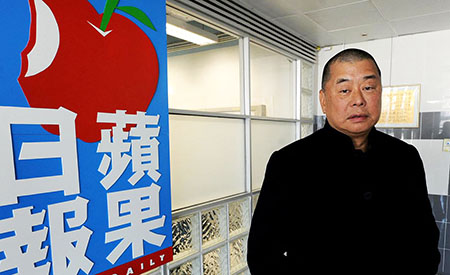Special to WorldTribune.com
 By Donald Kirk
By Donald Kirk
The history of the media is full of stories about journalists who defied authority, risked death covering wars and sought stories behind cover-ups. Few media heroes can match Jimmy Lai, founder of Apple Daily, a Hong Kong paper that was shut down last year after 26 years of defending Hong Kong’s democracy movement and offending China’s leadership in Beijing.
Lai, now 75, has been in prison now for nearly two years, and he has no chance of getting out any time soon. He was first jailed for inciting the protests that shook Hong Kong a few years ago, and now he’s been sentenced again, this time to another 69 months, for “illegally” renting out space in his office to one of his own companies.

That charge is patently bogus. Diligent prosecutors may have come up with some technicality in the fine print of an obscure law, but the reason for convicting and sentencing Lai is that Beijing wants to lock him up for as long as needed to draft and press much more serious charges of violating China’s national security law. It will be interesting to see what they make up to justify a case that will guarantee he remains in prison for life.
China’s relentless pursuit of Lai burnishes his image as a fearless media star. If the masterminds in Beijing who pull the strings of their puppet judges and prosecutors were really smart, they’d order a suspended sentence, place him on probation and set him free. They’ve already closed the paper, a thorn in their side for its criticism of the massacre of protesters in Beijing’s Tiananmen Square in June 1989 and then for blasting Beijing’s increasingly oppressive rule over Hong Kong.
As a free man, Lai might be expected to say what he thinks of the rule of President Xi Jinping, who undoubtedly was and is responsible for making Lai suffer for his “sins” against the regime. By holding Lai forever in jail, however, his case will reflect far more adversely on Beijing. He will be deified as a martyr in the cause of press freedom. Xi and his people will be powerless to knock him off that pedestal even as he languishes in jail.
There are, of course, more oppressive regimes. One only has to look to North Korea, where every word in print, online or on the air is as dictated from above. It is miraculous that Apple Daily, a populist and often sensational tabloid in a highly competitive environment where no fewer than 90 papers competed for attention, lasted as long as it did.
Lai’s success with Apple Daily had storybook origins. He began his career neither as a journalist nor an activist. Instead, he worked his way up to manager in a factory that made sweaters and then opened his own store, Giordano, purveying trendy clothing first in Hong Kong and then throughout Asia. He’s got a sister doing business in Canada and a son in the U.S.
|
If the masterminds in Beijing who pull the strings of their puppet judges and prosecutors were really smart, they’d order a suspended sentence, place him on probation and set him free. They’ve already closed the paper …. |
Lai could easily have been a much greater tycoon had he chosen to stay out of politics or journalism and focus on business. He preferred, though, to make a splash by founding a media company, later called Next Digital. Nor did he have to turn Apple Daily into a voice for protest against the regime. The paper was noted for its sensationalism, loud-mouth approach and gossip that had nothing to do with the potentates in Beijing.
The freedom that Lai enjoyed, in his rise in business and the media, was consistent with Hong Kong’s relative independence from China. Britain reverted Hong Kong to mainland Chinese rule in 1997 in a deal under which the former crown colony would be fairly democratic and self-governing for the next 50 years.
Beijing, however, never had any intention of keeping its side of the bargain. After the crackdown on Tiananmen, the authorities were not about to tolerate endless criticism from Hong Kong. They installed their own people in all the top positions, made the Legislative Council an echo chamber for their own edicts and finally muzzled the protests that filled streets and squares.
Apple Daily’s brash mixture of tabloid scandal and news was more than Beijing could stand. Jimmy Lai’s fall shows what can happen when Beijing extends its power and influence around the region. The media in Taiwan would suffer a far worse fate.
And certainly, Beijing would be all for stifling the media in Seoul if needed to bring about a false reconciliation between South and North Korea.
